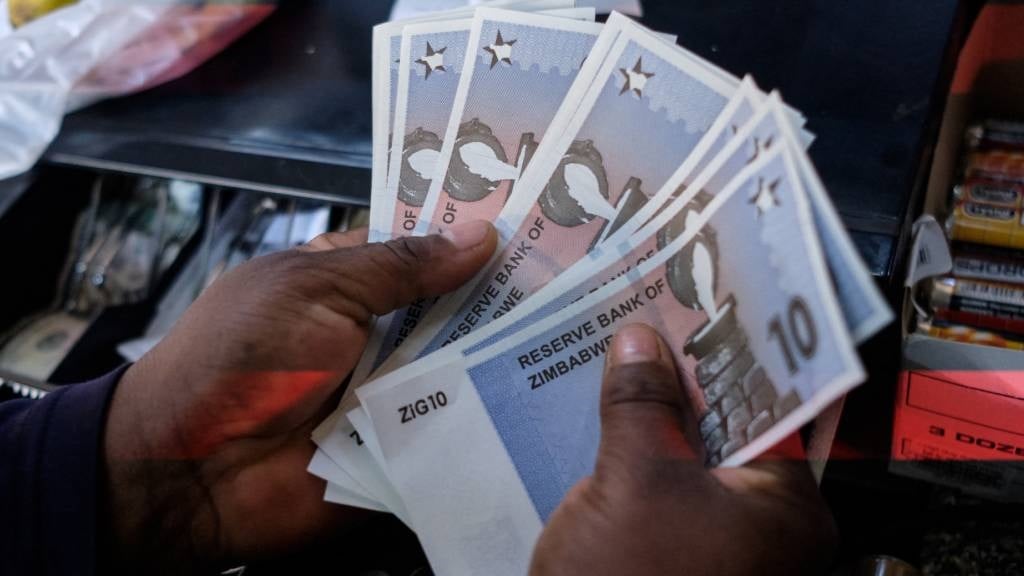

A cashier in a leading supermarket dispenses the new ZiG10 note, short for Zimbabwe Gold, from a till as change in Harare. (Jekesai Njikizana/AFP)
- Since its debut in April the Zimbabwe Gold currency has lost 80% value on the black market.
- The government is maintaining a formal rate of exchange that is losing them money and causing price volatility, retailers say.
- Unless that changes, formal shops will go out of business, an association warns.
The official exchange rate for Zimbabwe’s latest currency, Zimbabwe Gold (ZiG), is killing formal retailers, they have warned the government.
And though intended to hold back the country’s eye-watering inflation, ZiG is actually feeding price volatility and a two-tier system.
ZiG was introduced in April and has since lost 80% of its value on the black market, with some retailers saying it is backed by arrogance rather than gold.
Major retailers including South African-owned brands TM Pick n Pay, OK and Edgars, this week told the Reserve Bank of Zimbabwe (RBZ) that using the official rate of US$1 to ZiG13.9 – making the local currency stronger than the rand – was not sustainable.
ZiG was intended to bring stability, they said under the banner of the Retailers Association of Zimbabwe (RAZ), but it was having the opposite effect.
“Our suppliers have expressed concern that they are faced with an acute foreign currency shortage and excessive volatility of ZiG exchange rates on the black market that has now become the basis of their pricing framework”, they said.
READ | Despite crackdown, Zimbabwe’s gold-backed currency is crumbling too, just four months later
Black market trade is illegal, but is the main source of forex for many businesses. This week, trade there was at ZiG26 to the US dollar.
The retailers said their suppliers charge for goods and raw materials using a black market rate, and unless they hike prices on shelves, they can lose 50% on each sale.
The alternative is to do business in rands or dollars instead.
“Suppliers of goods and services into the formal retail sector are now maintaining two-tier price lists for local currency and another for foreign currency – whose implied rates are way higher than the obtaining official exchange rate,” said the retailers.
Some shops turn off their point of sale machines to avoid selling in ZiG. But with their prices rising in hard currency too, consumers are shunning formal retailers, the trade association said.
One example of their trouble is the popular Boom washing powder brand.
At wholesale, Boom costs US$3.40 at the official rate which should translate to ZiG$47.46. But wholesalers are asking for ZiG102.45, at an implied rate of ZiG30.13 to the dollar.
ALSO READ | Zimbabwe’s new currency holds fort amid fears of an exchange rate implosion
At the usual markup, Boom would sell at US$4.77. If sold at the formal rate, that would be ZiG70.60 – a substantial loss to the retailer.
Shops that choose to hike the dollar price to reflect the ZiG cost see customers leave for retailers that, illegally, refuse to accept ZiG. Without protection, that will lead to company closures, say the formal sector.
Mike Ncube, a sole trader, said though ZiG was new, the path it is on was all too familiar.
“All the currencies that have been introduced in the past in Zimbabwe with the slashing of zeros and renaming money have led to one thing, spiralling inflation. It all happens on the black market while the government is left holding nothing but legislation and rhetoric. They are backing their money with arrogance and not reality,” he said.
The RAZ suggested that the government let the market determine the exchange rate.
Zimbabweans have shown little faith in local currencies, even when they supposedly have hard backing.
This is not a new call, in 2016, the authorities introduced the bond note which was meant to replace the USD in the long run. By 2019, the government was forced to introduce a dollar component to salaries to ward off industrial action from employees who said they could not survive at the official exchange rate of the bond notes they were paid in.
The News24 Africa Desk is supported by the Hanns Seidel Foundation. The stories produced through the Africa Desk and the opinions and statements that may be contained herein do not reflect those of the Hanns Seidel Foundation.
